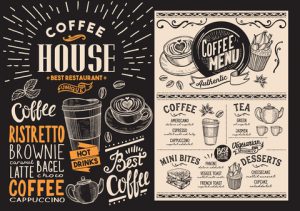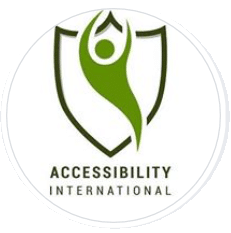Restaurants, hotels, airports, museums, bowling alleys, gyms, ski resorts, and many others in the hospitality and tourism industry have had to amp up their marketing efforts considerably to be able to make up for lost time when COVID forced closures around the world. To drive more traffic through your doors, your website needs to get the word out to all potential clients that you’re ready and eager to welcome them. If your website or other digital resources are inaccessible, excluding up to 25% of your audience, you’re losing business.
Up to 25% of the population has a disability and may use assistive technology. Often that means they’re unable to access your website unless it’s compatible with their assistive technology. If it’s not compliant, it also can put you at risk for lawsuits, which many others in the hospitality industry have faced. Foodservice, entertainment, and travel make up 3 of the top 4 industries facing digital accessibility lawsuits.
ADA compliance for hospitality includes PDFs:
ADA compliance for hospitality extends to more than just web pages. It also extends to any files stored on your website, such as video, audio, or most commonly, PDF files.
PDF documents that need to be accessible:
- Directories

- Menus
- Brochures about products and services
- Travel guides
- Schedules
- Tournament and contest rules
- Maps
- Coupon books
- Itineraries
- Points statements
What laws apply?
The Supreme Court has recently sided with a number of circuit courts that have held that websites are also places of public accommodation, especially when they are nexus to a physical place of public accommodation. Title III of the ADA prohibits discrimination on the basis of disability in the activities of places of public accommodations.
What standards should you meet to ensure ADA compliance for hospitality companies?
The ADA doesn’t specifically outline digital accessibility standards. The Department of Justice has left digital accessibility vague because accessibility will look different for each website depending on its content and structure.
However, Web Content Accessibility Guidelines (WCAG) will give you the most comprehensive standards for ensuring an accessible website. WCAG is the industry standard, though it’s not officially part of ADA regulations. A number of different countries and circuit courts in the US consider it the standard for digital accessibility.
What happens if your website isn’t compliant with the ADA?
As many as 25% of your customers and employees are disabled. They may use assistive technology to access your website and digital files. It’s discriminatory to deny certain groups the ability to access your digital information by failing to make your resources accessible. When people are denied access to information, they feel frustrated and may take legal action if the accessibility issues remain unresolved. In 2019 alone there were 553 digital accessibility lawsuits against companies in the hospitality industry. Accessibility lawsuits are time-consuming, bad for business, and very expensive.
Inaccessible menus, travel information, brochures, and other PDF documents can discourage customers from visiting your business. When they’re unable to access the information they’re looking for on your website, 69% of visitors with disabilities will click away from your website. They will take their business to a competitor who has considered their needs. If your website is driving business to your physical location, that means fewer guests are coming through your doors. Chances are, their friends and family won’t be coming either.
Whether you’re facing a lawsuit or have clients who are taking their business elsewhere, inaccessible PDF documents will cost your company reduced income, increased expense, and damage to your reputation.
Lawsuits enforcing ADA compliance for hospitality:
Robles v Dominos
Guillermo Robles is Domino’s Pizza customer who is blind. He was unable to order a pizza because the Domino’s ordering platform is inaccessible to his assistive technology. Robles filed a lawsuit in response. Defendants typically settle cases like this, but Robles v Dominos became a landmark case when Domino’s appealed the lower Circuit Court’s decision to side with Robles. Domino’s took the case all the way to the Supreme Court, who dismissed it because they saw no reason to disagree with the lower courts and review the case. The Supreme Court agrees with the lower Circuit Courts that websites should be considered places of public accommodation. As such, they are subject to ADA regulations preventing discrimination.
Haynes v Hooters
When Dennis Haynes, who is blind, was unable to access Hooters’ website with his assistive technology, he filed a lawsuit against the restaurant chain. Haynes sought an injunction, declaratory relief, and court costs and legal fees to remedy Hooter’s discrimination against him. Hooters claimed that Haynes couldn’t sue them because they were already in the process of fixing their inaccessible website in response to a previous accessibility lawsuit. Courts first dismissed the case in favor of Hooters, but the plaintiff appealed in the 11th Circuit Court and won. The Circuit Court found no evidence that Hooters was indeed making its website accessible. The problems presented in the first lawsuit were still live on the website. This case is the first of its kind that allowed websites to be sued more than once over the same accessibility issues.
Class action lawsuit against Marriott by employees
 Ali Faraj has worked at Marriott for 8 successful years. He has been in the hospitality industry for ten years and holds a BA in Hospitality Business. But despite his education and experience, Marriott won’t promote Faraj to management because of one simple fact- he is blind. He cannot use the chain’s Customer Relation Management (CRM) software system because it is not compatible with his assistive technology. Marriott could have chosen another CRM software system or upgraded their current program to make it accessible, but they chose not to. According to Faraj, a Human Resources representative even told him that people who were less qualified were awarded management positions because they were able to use this software.
Ali Faraj has worked at Marriott for 8 successful years. He has been in the hospitality industry for ten years and holds a BA in Hospitality Business. But despite his education and experience, Marriott won’t promote Faraj to management because of one simple fact- he is blind. He cannot use the chain’s Customer Relation Management (CRM) software system because it is not compatible with his assistive technology. Marriott could have chosen another CRM software system or upgraded their current program to make it accessible, but they chose not to. According to Faraj, a Human Resources representative even told him that people who were less qualified were awarded management positions because they were able to use this software.
Reed v Avanti Hotel
A Montana woman who is blind attempted to book a room at the Avanti Hotel of Palm Springs, California through their website. However, the Avanti had not made their website accessible to assistive technology so she was unable to complete the transaction. In response, the frustrated woman filed a lawsuit against the hotel. Addressing the accessibility issues will cost the hotel roughly $3,000 while damages awarded to the plaintiff could be as much as $8,000- $20,000. Had the hotel made its website accessible from the beginning, spending the $3,000 before the website went live, they could have saved themselves thousands of dollars in legal fees and lots of negative press. Now their website explains that they had to remove some features because of ADA requirements.
How to avoid litigation:
When you begin tackling digital accessibility, ensure all your digital resources are accessible, not just your web pages. Video, audio, and PDF files, whether client- or employee-facing, must also be accessible.
These PDFs might include individual documents like travel brochures, museum pamphlets, dining menus, or a listing of spa services. Individual PDFs can be quickly and easily remediated in-house with PDF remediation software such as Equidox.
Large quantities of documents that all appear in the same format but with varying data, such as billing statements or rewards points summaries can be remediated using a batch processing service such as the one offered by Equidox. Equidox can create Custom coding just for your batch documents which would identify key components on the page and tag them automatically and instantly.




